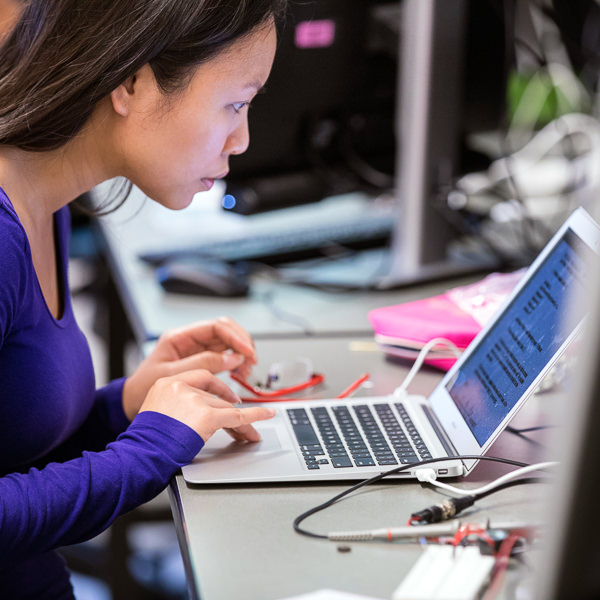Master of Science in Electrical & Computer Engineering

Gain advanced, in-depth knowledge across a breath of electrical engineering topics and use state-of-the-art technology. Become an innovator, researcher and technical leader in your profession.
- 46 credit curriculum
- Part- or full-time enrollment
- Afternoon and evening classes designed for working professionals
- Coursework-based masters with thesis option
- Research opportunities with faculty
Students tailor their path through the program and choose the coursework or thesis option. These pathways give students the opportunity to acquire advanced skills and further conceptual understanding of electrical and computer engineering. Alumni are ready to advance in their careers with the skills to design, analyze and optimize electronic and electrical systems.
Coming from a non-electrical and computer engineering major?
Prepare to go into the Master of Science in Electrical & Computer Engineering through a bridge program. Take six graduate-level courses in nine months to build a strong foundation in DC circuit analysis, digital systems, device electronics, AC circuits and power, signals and systems, and embedded systems.
Explore the graduate certificate program
Information session
Join us to learn about the program, admission, and career opportunities.
Email sign up
Receive program details, get to know UW Bothell and get application reminders sent to you.
Watch our latest Electrical & Computer Engineering Research Talks
Electrical Engineering master’s candidate class presentations
Master’s students in the Acoustical Engineering: Medical Devices (B EE 532) class presented their research findings in a presentation to fellow classmates, faculty, and industry professionals. This class focused on the analysis of advanced applications of diagnostic and therapeutic ultrasound systems to brain and to peripheral tissue. Watch the B EE 532 class presentations.
Optimal integration of electric vehicles (EV) and renewable distributed generation (DG) in distribution micro-grids
Dr. Mahmoud Ghofrani, associate professor, and Nawal Hersi, current Electrical Engineering student, discuss an optimization to address the adverse operational effects of adopting and integrating DGs and EVs too quickly. This talk provides an efficient and reliable method to integrate EVs and renewable DGs in distribution grids. Watch the EV and DG talk.
Low-cost phased array antennas for LEO satellite internet links
Dr. Walt Charczenko, affiliate assistant professor and lecturer, and Cheryl Kung, an antenna engineer pursuing a Master of Science in Electrical Engineering, talk about Cheryl’s independent study focused on designing, testing, and mass-producing millimeter Wave phased array antennas using new low-cost planar circuit board and additive printing techniques. Watch the antenna talk.
Next generation memory technology: a Resistive Random-Access (ReRAM) Memory
Dr. Seungkeun Choi, associate professor and EE program coordinator, and Moosa Raza, MSEE candidate, talk about the fundamentals of a ReRAM device and presents the most recent outcomes researched by Moosa. Watch the ReRAM talk.
Find out more about the MSECE degree
In this video, hear from our faculty and alumni about the electrical and computer engineering field, our curriculum and faculty research and how the MSECE program can shape your future career.
Schedule an appointment
Future and current students can book an appointment to meet in person or online with an advisor.
Looking for the thesis final exam schedule? Find it on the thesis defense schedule page.
